Friday, September 30, 2011
 1:31 AM |
The Long Goodbye
1:31 AM |
The Long Goodbye
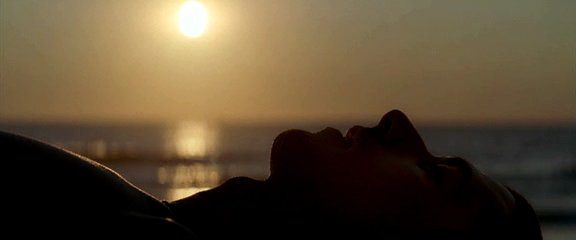
François Ozon's
Le Temps Qui Reste [
Time to Leave, 2005] is a beautiful film about learning to accept life even as one learns to accept certain death. In it, Melville Poupaud delivers a bravura performance -- which goes from cocky to douchebaggy to affected to frail but triumphant -- as a gay photographer who discovers he has terminal cancer, refuses chemotherapy, quits his job, and proceeds to alienate his family and dump his lover. And then somehow, from the unquiet emotional dreck he puts himself in, he finds his humanity. I make it sound melodramatic. It's not. This is an Ozon film after all, and this prolific fimmaker has never ever been melodramatic. He could be sly and perverted and comedic, but never melodramatic, not even in the fantastic
Swimming Pool [2003]. But this is an Ozon film that seems most straitlaced and emotionally raw, even as it tries to haul in the sentimentality with a restraint that shows. Nevertheless. That last sequence on the beach as Poupaid's Romain sees the sunset for the last time is a masterwork of empathy. A painful film to watch, but oh so beautiful.
Labels: death, film, queer
[0] This is Where You Bite the Sandwich

Thursday, September 29, 2011
 10:51 PM |
The Dangers of Comfort, The Theater of Dinner Conversation
10:51 PM |
The Dangers of Comfort, The Theater of Dinner Conversation
And I don’t mean the pedestrian gossip that slakes over our dinner tables most of these days—although that, too, has its own perverted pleasures. The thrill of finding frail humanity among our kind. Schadenfreude as drama.
“Did you know so-and-so and so-and-so got together over the weekend?”
“Seriously? But what about so-and-so? Aren’t they living together?”
“Well, a little birdie told me that so-and-so has done this-and-that.”
“Oh. Em. Gee.”
Not that.
What I mean is dinner conversation of the illuminating kind—not about politics or religion, those two deadly bores. But about the place of humanity in the scheme of the universe, in philosophy—leavened, of course, by anecdotes from personal experience. Imagine a conversation about art, a painting or sculpture or what-not a friend of yours have seen in a museum which has touched him, which has given him fodder for thought. Imagine that friend as an impresario of talk. Over a three-course meal, pushed by the sweet intoxication of red wine, you hear him give a dramatic musing of what he has seen. You are both surrounded by kindred spirits, and the talk becomes organic, more philosophical, a little bit tipsy from the wine. There are affirmations, counter-arguments, jokes and laughter, more illuminating anecdotes. You leave that dinner table knowing you have learned a little bit more about the nature of humanity. You become, at least for a few hours during and after that dinner, a better human being—because you have partaken of a strange communion, a mix of food and words and friends.
I find myself in rare instances of this in Dumaguete. When the chance presents itself—usually in the delightful company of Dessa Quesada-Palm, Arlene Delloso-Uypitching, Esther Windler, Cecilia Hoffman, Annabelle Lee-Adriano, Laurie Raymundo, Margaret Helen Udarbe, Betty McCann, Moses Joshua Atega, Patrick Chua, Myrish Antonio-Cadapan, Jacqueline Veloso-Antonio, Leo Mamicpic, Ben Malayang III and his wife Gladys, Myrna Pena-Reyes, Tata and Simon Stack, John Stevenson, and assorted artists/friends from Manila and elsewhere who would join us—I grab it, and I prepare for a night of scintillating talk, knowing it is good for the soul, and for the mind.

I thought as much when I saw the filmed dinner conversation between André Gregory and Wallace Shawn, playing versions of themselves in Louis Malle’s
My Dinner with André [1981]. This film, hailed as a unique cinematic experiment and is considered one of the best films to come out of the 1980s, is ripe with witticism, philosophical musings, and provocative thoughts, but this one strain of dialogue between the two struck me the most:
ANDRE: I mean, if you don't have that electric blanket, and your apartment is cold, and you need to put on another blanket or go into the closet and pile up coats on top of the blanket you have, well then you know it's cold. And that sets up a link of things: you have compassion for the p-- ... well, is the person next to you cold? Are there other people in the world who are cold? What a cold night! I like the cold, my God, I never realized, I don't want a blanket, it's fun being cold, I can snuggle up against you even more because it's cold! All sorts of things occur to you. Turn on that electric blanket and it's like taking a tranquilizer, it's like being lobotomized by watching television. I think you enter the dream world again. I mean, what does it do to us, Wally, living in an environment where something as massive as the seasons or winter or cold don't in any way affect us? I mean, we're animals after all. I mean, what does that mean? I think that means that instead of living under the sun and the moon and the sky and the stars we're living in a fantasy world of our own making.
WALLY: Yeah, but I mean, I would never give up my electric blanket, André. I mean, because New York is cold in the winter, I mean, our apartment is cold. It's a difficult environment! I mean, our lives are tough enough as it is, I'm not looking for ways to get rid of the few things that provide relief and comfort, I mean, on the contrary! I'm looking for more comfort, because the world is very abrasive, I mean, I'm trying to protect myself, because really there are these abrasive beatings to be avoided everywhere you look.
ANDRE: Yeah, but Wally, don't you see that comfort can be dangerous? I mean, you like to be comfortable and I like to be comfortable, too. But comfort can lull you into a dangerous tranquility. I mean, my mother knew a woman, Lady Hatfield, who was one of the richest women in the world, and she died of starvation because all she would eat was chicken. I mean, she just liked chicken, Wally, and that was all she would eat, and actually, her body was starving but she didn't know it 'cause she was quite happy eating her chicken and so, she finally died! See, I honestly believe that we're all like Lady Hatfield now, we're having a lovely, comfortable time with our electric blankets and our chicken, and meanwhile we're starving because we're so cut off from contact with reality that we're not getting any real sustenance. 'Cause we don't see the world. We don't see ourselves. We don't see how our actions affect other people.
[The transcript of the film can be read here.]
End scene.
The dangers of comfort. That made me take pause. Because I have been thinking about this for some days now. And there it was, the whole notion of it, discussed at length in one of the best films of all time. And I have just stumbled on it, like the “omens” they talk about in the film. Is this film my own form of Wally’s fortune cookie?
A few days ago, I posted this status update in my Facebook wall: “I don’t know what the Universe is trying to tell me these days, but I’m willing to listen.” The things is, I have been out-of-sorts lately, bombarded by tiny problems with magnificent wings which I can’t talk about to anybody, trying to make sense out of ... something. I had no idea what was bothering me, but I have been feeling odd. Strangely sad, feeling blue. And so I popped in this film like I have always promised myself I would. And I’m glad I did.
And what a beautiful film it is. When it ended, I just stared and stared off into space as the end titles rolled over Erik Satie’s
Gymnopédie No. 1, and I was thinking about the things they were talking about: theater, domesticity, the imprisonment of comfort, how life must be lived when one realizes how we have forgotten to connect... I think this is one film one should watch when one turns 36 (Wallace’s age when this was made). I’m 36 now, and I love the film because I feel it now, more thoroughly, because of having have lived. Because the questions it asks are things I have come to know through all those years. I wouldn’t have gotten this film when I was 21.
Amy Taubin
in the Criterion website captures exactly what I felt upon finishing: “And then the dinner is over. Nothing is concluded—not for Wally or André, and certainly not for the audience. But on the way home, Wally is surprised to find that something has changed in the way he attends to the city as he sees it from the taxi window. And that slight shift in consciousness is what André ... would have applauded. And we might do the same as the image fades to black.”
The film finally reminds me that I need to have dinner with my good people again. Because you need these little events of gab to go beyond the vapidity of everyday life, the drone of television, the mindless cares of zombies around you. A dinner conversation is a small strike against the electric blanket of life. It is rare when the right talk chemistry sparks, and so when it happens, one has to be of mind to cherish it.
Labels: film, life, philosophy, theater, travel
[0] This is Where You Bite the Sandwich

Thursday, September 22, 2011
 2:16 AM |
The Threshold of Age
2:16 AM |
The Threshold of Age
I have a thirtysomething's fear of growing old: the threshold is coming nearer, yet one still feels incredibly young in a body increasingly betraying itself. Old men have the pleasure of having succumbed to age. Young men have the bliss of ignorance, that exquisite blind faith that old age can never happen to them. The man in his thirties, alas, lives in a constant state of terror and denial.
Labels: life
[1] This is Where You Bite the Sandwich

Thursday, September 15, 2011
 5:59 PM |
Charming Devils
5:59 PM |
Charming Devils
You know what they say about experience, right? That you learn from it? If that is the case, I'd be foolish then not to learn from this realization: charming people -- incredibly polite, outwardly gentle -- are the spawns of the devil. I still hope to find myself in the wrong here, but I'm talking from experience. How many times have I been surprised to find that the many charming people I've come to know are, in private, capable of unfathomable nastiness that borders almost on evil? There's this one guy I used to know who's quite lovable, he charms the hell out of you with such careless
pa-cuteness. In private, however, I know him as someone who can carry hours of hateful litany about every person he knows, his paranoia deep, his neurosis almost psychotic. And then he goes out the door brightening like the very sunshine itself. I know many others, seemingly harmless, always soft-spoken, even polite to a fault -- and then you discover in them that wellspring of darkness.
What's up with that?
Then again, let's consider the long list of people who have been described as charismatic, they mesmerize you in their presence: Charles Manson. Rafael Leónidas Trujillo. Muamar Gaddafi. Adolf Hitler. Lucifer.
Fear charming people. They seduce your soul, in order to eat it.
Labels: life
[1] This is Where You Bite the Sandwich

Tuesday, September 13, 2011
 7:46 PM |
I Know That Man
7:46 PM |
I Know That Man
I still feel for that man who mourned. Looking at him, from this distance defined by time, I can see that his heart was so big. So big, I understand why he felt it needed filling. I can understand why he thought he had found the very thing to fill it -- there was lightness, there was laughter, there were the silly promises of kisses, all things we mistake for love. I understand the dark days, where they come from. I understand the swift belief in madness: it was the only available kind of logic. Or so it seemed. I understand. And I understand the mourning, most of all. He mourned for the longest time, that man I see. I can come closer now, see how he deflected all that with rehearsed nonchalance; he wanted the world to know nothing; and so it knew nothing. But his eyes. Look at his eyes. There's a language there that's a cross between deadness and a scream. I see him. Somehow I know though that he knew I'd be here, my own eyes keen on retrospection, a little more grounded, removed beyond mere increments from knowledge of pain. How do I know? Because I look at him now, and he stares straight at me with that tiny dark glow of knowledge. He does not "see" me of course, not from behind that glaze of what should be falling tears -- oh, but he would not cry, that man, not that common drama. Everything surged beneath, all quiet rage, that searching hollowness that screamed, those unanswered questions streaming through his head that began with "Why?" and ended only with echoes, that bitter prayer that demanded a definition of love and loving and was answered only with a certainty of loss. I know that man. But I do not pity him. He would weather all that, I know. I know.
Labels: life, love
[0] This is Where You Bite the Sandwich

 2:00 AM |
Confounding Fables
2:00 AM |
Confounding Fables
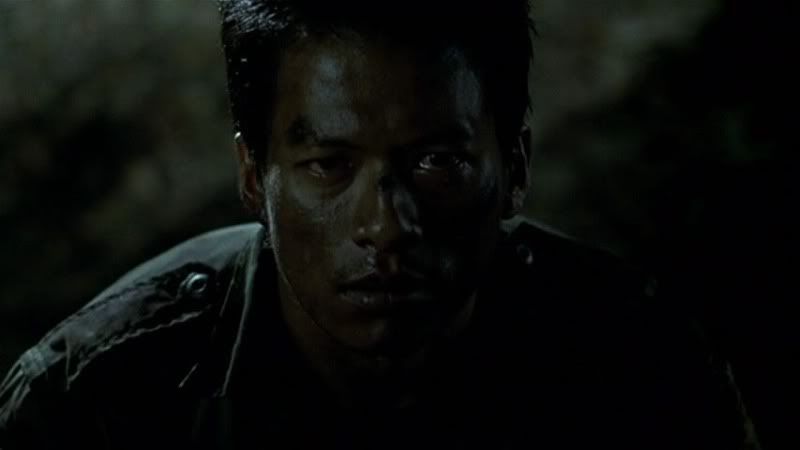
Apichatpong Weerasethakul’s สัตว์ประหลาด [
Tropical Malady, 2004] divided audiences when it premiered in Cannes more than half a decade ago — and understandably so. It is a confounding experience. The film is the story of two characters (a soldier and a country boy) who inhabit two different worlds and two different storylines in the same film, each one starkly different from the other in narrative and tone — and yet we are asked to regard both halves as organic to each other. And yet one can make the argument for the film’s simplicity. The first half is a simple love story about two men in coy courtship, and the second half is a simple fable about a soldier lost in the forest, placed under a spell by a shape-shifting shaman. And then you, the viewer, read what you can of it. A poetic Rorschach test done in cinematic form, if you ask me. I am not bothered by my confoundment, my logical reach for “What does it all mean?” In its depiction of rural Thai life, in its rumination of a brewing love, in its love affair with fable, in its unspooling of quiet tension in a dark forest tinged with magic, I find enough to be happy about, meaning be damned.
Labels: film, queer
[0] This is Where You Bite the Sandwich

 1:55 AM |
An Accidental John Waters Freak Show, Without John Waters' Wit
1:55 AM |
An Accidental John Waters Freak Show, Without John Waters' Wit
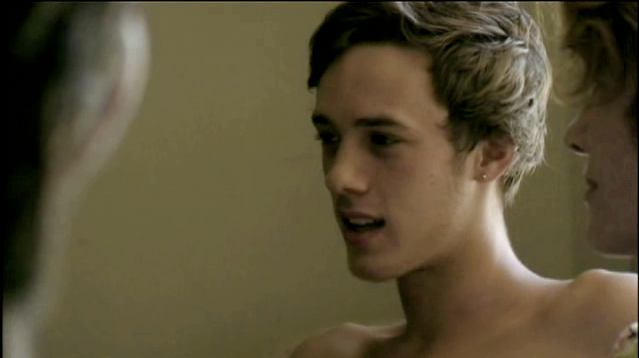
Australian director Ed Aldridge’s
Tan Lines [2007] is just the kind of ineptness in filmmaking that gets under your skin simply because this is just the type of film you want to root for but it does every single infuriating thing to shake your very faith in cinema. It is, in other words, a subtly hateful, confused mess of a film that does not know whether it wants to be a surfer film, an angst-ridden coming-of-age film, a gay love story, a social commentary on small lives barely hanging on, a psychedelic fantasia with strange animated sequences of Catholic saints talking, or a John Waters film filled with unbearable, out-of-place grotesques. Don’t take all that in. To understand this kind of confoundment is unworthy of any effort. And yet, at its core,
Tan Lines is a simple story about a gangly teenage boy named Midget Hollows (played with deadpan coyness mingled with naivete by a winning Jack Baxter, who alas cannot save this film) who lives in a seaside Australian town and dreams of getting out, to “see the world and shit.” He has reasons to. He is poor and lives in a cramped apartment and shares the same bed with his mother (always seen sleeping, covered with a blanket, with only her long manicured nails to signal there’s life under that slothfulness). His best friend and the rest of their friends are content with an endless cycle of nothingness, surfing, longboarding, and partying. And then Cass, his best friend’s older brother, arrives — a gay boy who ran away from home four years ago. Midget soon finds himself attracted to Cass — but don’t let this development fool you into thinking this will be a film about self-discovery, forbidden love, growing up, or the triumph of friendship through acceptance. It is none of that. It meanders instead into strange anecdotes about freaky adults — there’s a sinister older woman with a penchant for formal tea parties complete with a session of cunnilingus for her niece; there’s a band of elderly couples playing a kind of drunken stripping game after midnight in public; there’s an older female duo out for regular morning exercise complete with conversations running the gamut of sexual hijinks… The whole film seems an indictment against adulthood, and yet it is not heroic of the young either: the older folk are crazy, but the young are aimless zombies with zero ambition, and if they’re not, they’re wont to indulge in manipulation or violence. And yet one continues to root for a semblance of logic, or humanity, in this film — and that may be because beholding Mr. Baxter in such a waste of a role can’t seem possible. But in the end, he is truly wasted, and one ultimately has to throw up one’s hands and proclaim the entire film unwatchable. The acting of the entire supporting cast is worse than horrendous, the script is written on soiled tissue paper, the editing is non-existent, the cinematography is atrocious, the direction is aimless. A similar story, minus the freak show, can be found in Jonah Markowitz’s
Shelter [2007]. Forget this one, and find redemption in that one instead.
Labels: film, queer
[0] This is Where You Bite the Sandwich

Sunday, September 11, 2011
 10:59 PM |
Serious People.
10:59 PM |
Serious People.
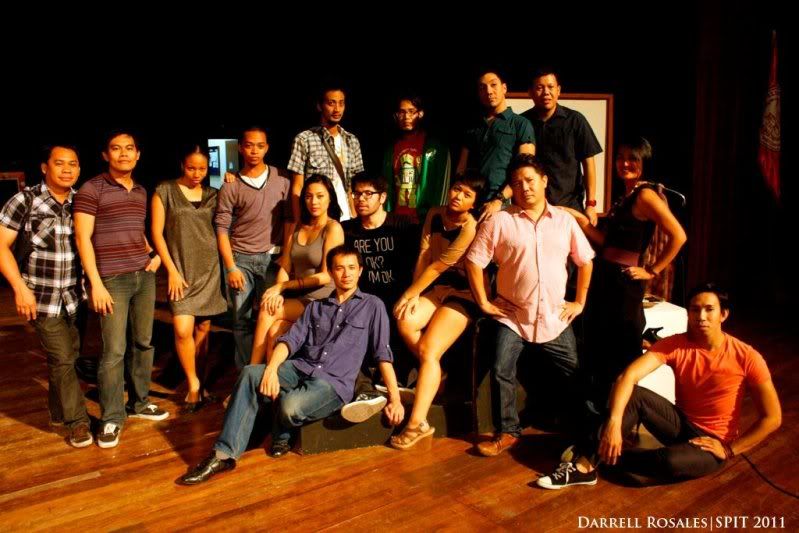
Emoting with SPIT Manila. Because we can.
From left, clockwise. Diomar Abrio, Ian Rosales Casocot, Hallona Ember, Linwell Bongcasan, Earnest Hope Tinambacan, Maliksi Zaragoza, Dingdong Rosales, Hendri Go, Dessa Quesada-Palm, Ariel Diccion, Gabe Mercado, Happy Ferraren, Kenneth Keng, Akong Bongcaras, and Aryn Cristobal.
[Claire Isabel McGill Luce Auditorium, 10 September 2011. Photo by Darrell Bryan Rosales.]
Labels: art and culture, comedians, cultural affairs committee, dumaguete, life, photography, silliman
[0] This is Where You Bite the Sandwich

 9:38 PM |
A Quick Appraisal of a City on the Verge
9:38 PM |
A Quick Appraisal of a City on the Verge
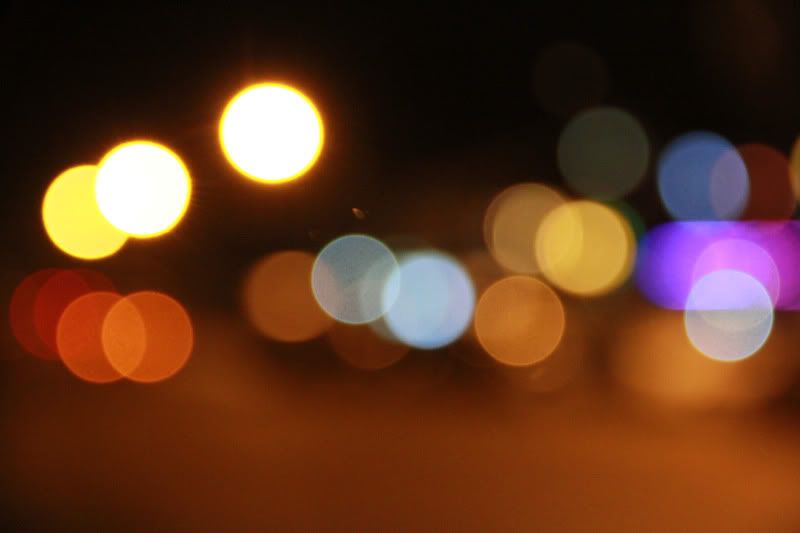
The thing about Dumaguete is this: it is so small that all kinds of drama here collide. The personal and the grand spectacles of the world play out before your eyes, each touching the other in the way of a caress. Last Monday, for example, was it only by chance that I decided to have dinner at the new digs of El Amigo—
the pesto steak is to die for, by the way—and while the great Filipino poetesses Merlie Alunan and Myrna Peña-Reyes were in the next table spending a quiet evening together with some friends (oh, to be a fly on the wall for that conversation), I had to spend time with two beautiful young friends—former students, actually—dealing with the matters of their romance, about which they have come to me for some advice? (I have no idea why young people come to me for love advice. Is it because I am a veteran from that endless battle?)
And it came to me, slowly at first, that this was how Dumaguete plays out its dramas. The small and the grand converge—the simmering quiet of our city streets is a sweet deception. All the world’s a stage, and its name is Dumaguete. The Palanca-winning poet Mikael Co, visiting Dumaguete over the weekend, said as much. Which was why he felt the need to come back after having been a summer writing fellow here years ago. “I tried to book a flight for Mom Edith’s funeral,” he said, “but it was impossible to get a single plane seat.” All the world’s coming to Dumaguete a lot these days, it seems. That Monday, for lunch, we both had joined Philippine
Star columnist and poet Krip Yuson who came to visit the grave of the National Artist for Literature, and with him were the Singaporean writer Kirpal Singh and Dumaguete’s first daughter of literature, Rowena Tiempo-Torrevillas. Over the spare ribs and the maya-maya, our conversations mingled and stirred right onto the walls of KRI, kissing the newly-mounted paintings of Hersley Ven Casero.
Later, I would get a message to join Presidential Spokesperson Edwin Lacierda for a media get-together on Tuesday night at Casablanca. There I would meet, for the first time, Manuel L. Quezon III—a longtime online friend. “Let’s have dinner tomorrow,” Manolo tells me. I said yes: “I know just a perfect place.” Of course, his Wednesday would be busy—the President of the Philippines was coming after all, and they were part of the advance party. I would shake President Noynoy Aquino’s hand the very next day during his onsite inspection of the Sy Family’s IT Park near St. Paul’s, on that lot which used to have the haunted Circular House, now gone. (Ah, the horror stories that have been subsequently razed by that very act of disappearance.) While waiting for his helicopter to land in the nearby airport, we went crazy over Ritchie Armogenia’s brownies, and we pondered the coming change in the landscape of this part of town.
And it came to me that Dumaguete is slowly changing before our very eyes. The landscape, the cityscape is changing—and we have been merrily blind to its subtle evolutions, surprised only once in a while by the sight of a shiny new building where once a dilapidated sari-sari store stood. “It’s changing, you just don’t know that it is,” Manolo told me the next night after dinner, while we strolled the Boulevard and I was giving him a quick historical tour of Dumaguete essentials—Silliman Hall, the sugar houses, why there were concrete nuns on the Boulevard, the significance of the palm trees and the acacia trees growing on the Boulevard’s grassy island. I pointed out the spots where the houses that Rizal stayed in once stood. I invoked the old tale of where we got the nickname of “city of gentle people,” although I was quick to point out it’s all hearsay. “There are no historical records of Rizal ever uttering this impression of the place,” I say.
And it came to me that I love this city after all—even with its smallness, with all its pettiness and pain, its generous memory of heartbreaks, the knowledge that the place can be a comfortable prison. But it is one-of-a-kind, and very much so. The other day, I wrote on my Facebook wall: “Welcome to Dumaguete. Where the country’s best writers gather every May for the National Writers Workshop, and the country’s best singers and songwriters gather every November for the Elements Singing and Songwriting Camp. I’m very proud of this city. (And once we get the planned annual film festival going...) Imagine the cultural possibilities. I do hope City Hall recognizes what untapped potential this cultural gold mine has in the long term...” More than fifty people immediately responded with a “like”—an avalanche of agreement over this blessing of a place.
The sociologist Lorna Peña-Reyes Makil tells me: "When we first came to Dumaguete in 1950, we felt we had found home. Twenty years later, in Honolulu for graduate studies, my heart longed for home. And from 1980 to 2002 during my sojourn in Manila, I dreamed of always coming back. Friends could not understand this—until they visited me these past years and were captivated. [But] yes, the rapid change we have now is overwhelming."
Here’s my former student Julienne Fortuna and her own take about the place on her own Facebook wall, with a very recent post: “I need to visit Dumaguete. I need to get away from the chaotic jungle that is Metro Manila and immerse myself in the simple and laidback Dumaguete life. I can already imagine myself walking around Silliman, eating in Neva’s or Habhaban, riding on former crushes’ motorcycles, snorkeling in Apo Island, and hanging out with friends at the Boulevard. After all, I’m one proud transplanted Dumagueteno.”
And then former
Weekly Sillimanian editor-in-chief Camille Celeste Go replied: “We’ve come a long way from hating Dumaguete because of how boring it is (compared to Davao), to loving it beyond words. I miss Duma-life too.” Then Julienne
posts this rejoinder: “It’s funny how we non-Dumaguetenos initially hated Dumaguete for, well, being the small city that it is. I’m sure most—if not all—of us complained to our parents about sending us there to study instead of Manila or Cebu. But after living there for four years or more, we’ve just grown to appreciate it for what it is and we all found it difficult to leave. I cried so hard about leaving twice: after graduation and when I decided not to enroll in SU Law. The irony gyud. Haaay, Dumaguete and its charm.
Guidagit jud ‘tang tanan.”
Manolo, too, told me: “I’m coming back.” And later, over text before his flight back to Manila: “I’m sad to be going!”
And there you go.
Gui-dagit.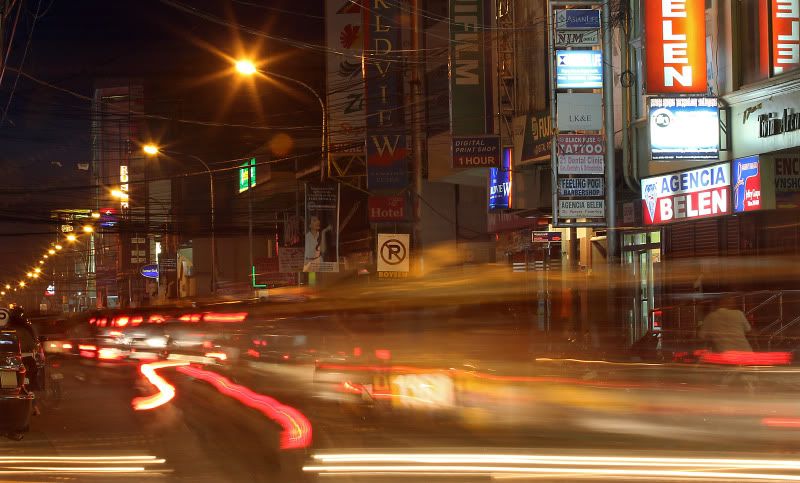
[Photos by Hersley Ven Casero]
Labels: dumaguete, friends, life, memories, negros, writers
[0] This is Where You Bite the Sandwich

 7:46 PM |
Where Were You Ten Years Ago Today?
7:46 PM |
Where Were You Ten Years Ago Today?
_9-11-n_12.jpg)
It's true what they say. You never forget where you were when you know your life first changed. Late afternoon of September 11, 2011. Halfway around the world, morning just started. It was a beautiful day. It promised to be a beautiful night. I had just come back from an early dinner with some friends, among them Patrick Chua and Moses Joshua Atega. We were still in a hangover from the monthlong centennial celebrations of Silliman University, and only two days ago, we had just bid farewell to my brother Rey, who was bound back to the United States after spending August at home. That late afternoon, we all went to Cafe Tropini, the bar in Why Not? that would soon become an extension of Le Chalet. We proceeded to order beer. Everybody, we soon noted, was watching the television with profound eagerness, perhaps even excitement -- that avalanche of ambiguous feelings one feels when confronted with the unbelievable.
"What's happening?" one of us asked.
A Caucasian guy drinking beer answered: "The goddamn Twin Towers. A plane just hit one of them."
Another Caucasian guy, drunk and dismissive, answered him, "The goddamn Twin Towers are in San Francisco. This is the World Trade Center."
We didn't care for their exchange. We just looked at the images that flashed before us, and I knew the world has changed. And suddenly, I could not fathom what exactly was in store for all of us in the coming decade. What would change?
Everything changed.
We hurried home.
* * *
I remember visiting Ground Zero in New York last November. I was on my own, going around on foot in lower Manhattan, eager to see what I could of the city before flying back home to the Philippines. I decided to go to Ground Zero.
From the observatory, I could see the grounds in a furor of so much activity. In the midst of the heavy construction machinery, one couldn't help but think, "So much life lost." And for those who witnessed the horror, our own lives over a decade were inevitably reconfigured. Who didn't change?
Nobody.
We are all children of 9/11.
Labels: history, life, memories
[0] This is Where You Bite the Sandwich

GO TO OLDER POSTS
GO TO NEWER POSTS

















 1:31 AM |
The Long Goodbye
1:31 AM |
The Long Goodbye

 10:51 PM |
The Dangers of Comfort, The Theater of Dinner Conversation
10:51 PM |
The Dangers of Comfort, The Theater of Dinner Conversation

 2:16 AM |
The Threshold of Age
2:16 AM |
The Threshold of Age
 5:59 PM |
Charming Devils
5:59 PM |
Charming Devils
 7:46 PM |
I Know That Man
7:46 PM |
I Know That Man
 2:00 AM |
Confounding Fables
2:00 AM |
Confounding Fables

 1:55 AM |
An Accidental John Waters Freak Show, Without John Waters' Wit
1:55 AM |
An Accidental John Waters Freak Show, Without John Waters' Wit

 10:59 PM |
Serious People.
10:59 PM |
Serious People.

 9:38 PM |
A Quick Appraisal of a City on the Verge
9:38 PM |
A Quick Appraisal of a City on the Verge


 7:46 PM |
Where Were You Ten Years Ago Today?
7:46 PM |
Where Were You Ten Years Ago Today?
_9-11-n_12.jpg)